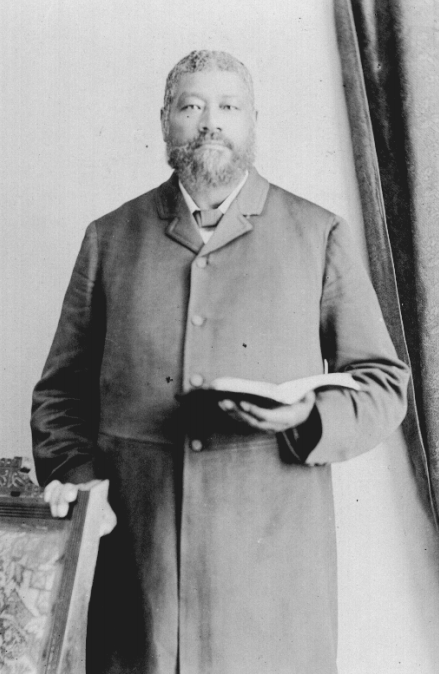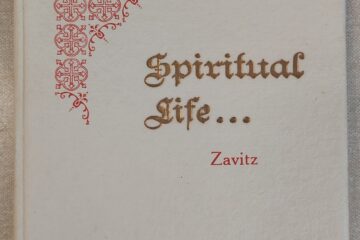William Allen, a Black American Quaker, spent his later years as a minister in Canada and the pastor of Newmarket Friends Church. Allen first visited Canada in 1875, though his return in the 1890s was permanent. A gifted orator, Allen spent five years preaching to different meetings in Canada and was described in his memorial as a “man of sterling character, noble in spirit,” and “firm in his conviction for the truth.”[1]
Born in Tennessee in 1821, Allen’s father was an Irish plantation owner and enslaver, and his mother was enslaved. He lived his early years under the bondage of his own father, and according to the writings of his ministerial companion Fred L. Ryon, his mother was sold when he was a young boy.[2] Allen spoke often of his experience living in slavery and the cruelties he witnessed growing up. This included the racism he faced when he preached.
Ryon’s memories include an incident that took place in a New York meeting where a group of men had gathered to stop Allen from speaking. Ryon recalled that Allen, upon being unable to continue due to the noise caused by the gathered group, “poured forth such a deluge of oratorical denunciation of infidelity as I had never heard before. The very foundation of the house seemed to tremble neath the tread of his indignant feet. The large part of the congregation was spellbound.”[3] Ryon also noted that when Allen travelled, many families that hosted him at first “felt a hesitancy about receiving him into their homes,” further demonstrating the racial inequalities that Allen faced. This never stopped Allen from sharing his story, and a pamphlet about Allen’s life recorded that Allen’s “reference to slavery days was full of pathos, and his graphic word-picture of his mother and his parting with her, burning into the memory of his audience.”[4]
In Allen’s memorandum book, he recorded lecturing on slavery in the following Ontario townships: Hibbert, Hatchley, Mariposa, Colebrook, and Moscow.[5] He also spent time in Pelham, Toronto, Gowrie, Uxbridge, Plymouth, Wellington, Bloomfield, and Pickering. On the subject of his calling to preach, Allen wrote:
My motto is to preach the preaching that the Lord bids, [re]guardless to what men may say, or what they may think. For it is God I am working for and not man. So I hold up a free salvation, every person can have it by repentance towards God & faith in our Lord Jesus Christ. My hope is built on nothing less than Jesus’ blood and righteousness. If we keep on the straight line with God we will have power to do his will. He will bless us in so doing.[6]
Allen also believed wholeheartedly in social reform and valued the role Quaker women played in public ministry. When he fell ill during his travels, he recorded that Alma Dale, a minister from Uxbridge, was able to take over his work and run the meetings. He stated: “the Lord blest us in sending us Alma Dale.”[7]
William Allen was an influential Friend and upon his death in 1898 he left behind a lasting legacy of great faith. Described as an outstanding leader, Ryon wrote that Allen’s “eloquence and sincerity left a lasting impression upon the large audiences which gathered wherever it became known that he would hold service. As the years passed, his ministry, broadened by diligent and continuous study, won for him the distinction of being known as the ‘traveling theological seminary of the Society of Friends.’”[8] Allen’s life and his work are a testament to the continual importance of anti-racism work and learning from the work of Black leaders.
[1] “A Memorial Concerning William Allen, An Esteemed Minister of Yonge St. Monthly Meeting of Friends,” Canadian Quaker Archives and Library, Newmarket, ON.
[2] Fred L. Ryon, “William Allen, Evangelist of the Society of Friends,” Bulletin of Friends Historical Association 47 (1958): 94. Ryon’s memoirs can also be read in the Canadian Quaker History Journal 65 (1999): 37-53.
[3] Ryon, “William Allen,” 99.
[4] Jessie M. Walton, From the Auction Block of Slavery to the Rostrum of the Quaker Ministry: The Life of William Allan (Aurora, ON: J. M. Walton, 1938).
[5] William Allen’s memorandum book was transcribed by Jane Zavitz Bond and can be read in the CQHJ 64 (1999): 54-73.
[6] “William Allen’s Memorandum Book 1887-1891,” CQHJ 64 (1999): 71.
[7] “William Allen’s Memorandum Book 1887-1891,” 59.
[8] Ryon, “William Allen,” 105.


1 Comment
Robynne Rogers Healey · February 10, 2021 at 7:34 pm
Thanks for this wonderful post about William Allen and his work in Newmarket. I especially appreciate the link to the Allen’s diary in the notes to the blog post. What a fabulous resource.